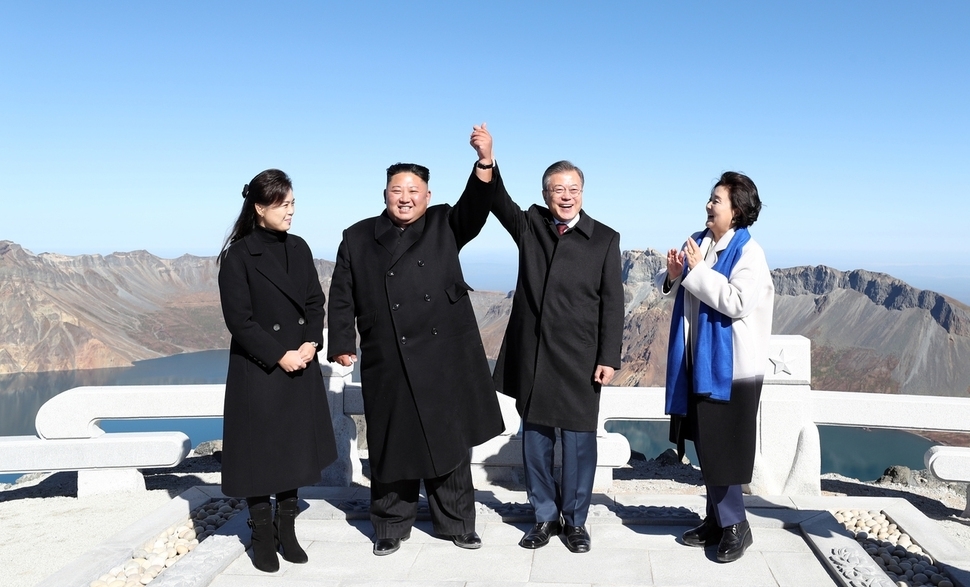 |
|
South Korean President Moon Jae-in and first lady Kim Jung-sook and North Korean leader Kim Jong-un and first lady Ri Sol-ju pose for a commemorative photograph on top of Mount Baekdu during the third inter-Korean summit in September. (Hankyoreh archives)
|
North Korea declines to respond by Dec. 10 deadline for arranging visit
Amid the decreasing likelihood of North Korean leader Kim Jong-un paying a reciprocal visit to Seoul before the end of the year, some expect that his visit will not take place until after the North Korea-US summit in early 2019. “This is a situation where it would take us time to prepare even if North Korea did get in touch with us, and the North has apparently not reached a decision yet. If the North Korea-US summit ends up being scheduled for the end of January, that could be another factor,” a senior official at the Blue House said on Dec. 11. The official said that if the North Korea-US summit is confirmed for the end of January, the North would have to focus on preparing for that summit, raising the possibility that Kim’s return visit to Seoul would take place after that. “Basically, it’s no longer feasible for the visit to take place this year, and it might happen after the North Korea-US summit,” said another senior official in the South Korean government. With North Korea declining to respond by Dec. 10, which had been regarded as the deadline for arranging a visit by Kim before the end of the year, change is in the cards for the plan to use the inter-Korean summit to create momentum for dialogue that could lead to results in the North Korea-US summit. This change represents a reversion to the original idea that an inter-Korean summit held after the North Korea-US summit is the best way to achieve meaningful results in inter-Korean relations. North Korea’s silence seems to reflect its belief that it will be impossible to reach meaningful progress on inter-Korean economic exchange even if Kim did visit Seoul until the North has convinced the US to ease sanctions. It also appears that Kim remains reluctant to decide to take an additional step toward denuclearization, which he would have to do in an inter-Korean summit in order to make progress in his summit with the US. Kim remains reluctant to decide on additional denuclearization steps “North Korea also understands now that the only way to achieve progress in its negotiations with the US is to take a bold step toward dismantling its nuclear program, such as disclosing part of its nuclear inventory, separately from closing its Yongbyon nuclear facility. But at the moment, North Korea appears to be facing a dilemma. It doesn’t trust US promises enough to take such an important step, while Chinese assurances about security don’t seem credible enough to warrant action following the China-US summit,” said Cho Sung-ryul, a senior research fellow for the Institute for National Security Strategy. During a special lecture organized by the National Unification Advisory Council on Tuesday, Unification Minister Cho Myoung-gyon emphasized the importance of holding an inter-Korean summit prior to the North Korea-US summit. “An inter-Korean summit would be quite significant in the sense that it would serve as a stepping stone to a North Korea-US summit,” Cho said. “Our deliberations with the North Koreans continue, and we’re waiting for a response from them,” Cho said. By Park Min-hee and Seong Yeon-cheol, staff reporters Please direct comments or questions to [english@hani.co.kr]






